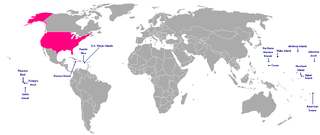This article needs additional citations for verification .(November 2015) (Learn how and when to remove this template message) |
The United States House Committee on Insular Affairs is a defunct committee of the U.S. House of Representatives.

The United States House of Representatives is the lower chamber of the United States Congress, the Senate being the upper chamber. Together they comprise the legislature of the United States.
The Treaty of Paris, signed on December 10, 1898, officially concluded the Spanish–American War. According to the provisions of the treaty, Spain ceded the Philippine Islands, Puerto Rico and Guam to the United States, and relinquished her sovereignty over Cuba. On January 1, 1899, the Spanish evacuated Cuba, and control of the island was assumed by a military governor who represented the United States. On December 8, 1899, the U.S. House established the Committee on Insular Affairs to consider "all matters (excepting those affecting the revenue and appropriations) pertaining to the islands which came to the United States through the treaty of 1899 with Spain, and to Cuba." [1]
The Treaty of Paris of 1898 was a treaty signed by Spain and the United States on December 10, 1898, that ended the Spanish–American War. In the treaty, Spain relinquished all claim of sovereignty over and title to Cuba, and ceded Puerto Rico, Guam, and the Philippines to the United States. The cession of the Philippines involved a compensation of $20 million from the United States to Spain. The Treaty of Paris came into effect on April 11, 1899, when the documents of ratification were exchanged.

The Spanish–American War was fought between the United States and Spain in 1898. Hostilities began in the aftermath of the internal explosion of USS Maine in Havana harbor in Cuba, leading to U.S. intervention in the Cuban War of Independence. U.S. acquisition of Spain's Pacific possessions led to its involvement in the Philippine Revolution and ultimately in the Philippine–American War.

Spain, officially the Kingdom of Spain, is a country mostly located in Europe. Its continental European territory is situated on the Iberian Peninsula. Its territory also includes two archipelagoes: the Canary Islands off the coast of Africa, and the Balearic Islands in the Mediterranean Sea. The African enclaves of Ceuta, Melilla, and Peñón de Vélez de la Gomera make Spain the only European country to have a physical border with an African country (Morocco). Several small islands in the Alboran Sea are also part of Spanish territory. The country's mainland is bordered to the south and east by the Mediterranean Sea except for a small land boundary with Gibraltar; to the north and northeast by France, Andorra, and the Bay of Biscay; and to the west and northwest by Portugal and the Atlantic Ocean.
Just 6 days earlier, on December 6, 1899, the United States had acquired exclusive rights to certain islands in Samoa through an agreement with Britain and Germany. Subsequently, matters relating to American Samoa also came within the committee's jurisdiction. In 1902 the Republic of Cuba was established, and jurisdiction over matters concerning Cuba was transferred to the Committee on Foreign Affairs in 1906. Eventually, the jurisdiction of the Committee on Insular Affairs was expanded to cover the United States Virgin Islands which were purchased from Denmark by the treaty in 1916. In 1946 the committee was abolished and its responsibilities transferred to the Committee on Public Lands.

Samoa, officially the Independent State ofSamoa and, until 4 July 1997, known as Western Samoa, is a country consisting of two main islands, Savai'i and Upolu, and four smaller islands. The capital city is Apia. The Lapita people discovered and settled the Samoan Islands around 3,500 years ago. They developed a unique Samoan language and Samoan cultural identity.

The British Empire comprised the dominions, colonies, protectorates, mandates and other territories ruled or administered by the United Kingdom and its predecessor states. It originated with the overseas possessions and trading posts established by England between the late 16th and early 18th centuries. At its height, it was the largest empire in history and, for over a century, was the foremost global power. By 1913, the British Empire held sway over 412 million people, 23% of the world population at the time, and by 1920, it covered 35,500,000 km2 (13,700,000 sq mi), 24% of the Earth's total land area. As a result, its political, legal, linguistic and cultural legacy is widespread. At the peak of its power, the phrase "the empire on which the sun never sets" was often used to describe the British Empire, because its expanse around the globe meant that the sun was always shining on at least one of its territories.

Germany, officially the Federal Republic of Germany, is a country in Central and Western Europe, lying between the Baltic and North Seas to the north, and the Alps to the south. It borders Denmark to the north, Poland and the Czech Republic to the east, Austria and Switzerland to the south, France to the southwest, and Luxembourg, Belgium and the Netherlands to the west.











